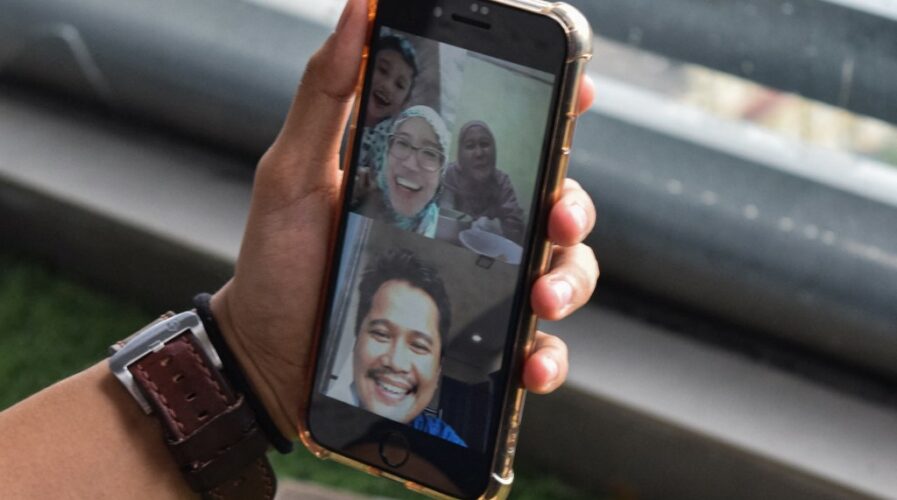
Malaysia’s 5G network deployment will benefit industries and consumers, especially those who rely on tools such as video calls or conferencing. (Photo by Sam Reeves / AFP)
Has Malaysia’s 5G operator DNB finally given in to telcos?
Early last month, Tech Wire Asia reported that none of Malaysia’s local telcos had bit the bait by Malaysia’s 5G operator DNB to take up its 5G services.
In what appears like a desperate attempt to bring Malaysian telcos on board, Reuters reported today that the Finance Ministry’s special purpose vehicle, Digital Nasional Berhad (DNB), has announced that it will offer wholesale 5G services to mobile carriers at no cost.
In a statement, the state agency claimed that 5G services will be commercially available from 15 December onwards in three central areas, including parts of Kuala Lumpur.
This offer to allow all operators to be part of its network for free will take place during the initial 5G rollout period taking place next week — and will be valid up to 31 March 2022.
DNB is seeking to finalize its wholesale agreements with carriers during this period and hopes to sign long-term contracts with them by early 2022.
As reported by Reuters, an RAO (Reference Access Offer) will be approved by Malaysia’s communications regulator soon following extensive feedback from the industry.
An RAO is a public document that will cover the details of the DNB’s 5G wholesale model, including pricing and service commitments.
Operators that sign up to its wholesale plan before March 31 will receive further free access to all additional 5G capacity during the initial period of operation, it said.
It also reiterated that its 5G pricing plan would be cheaper for mobile carriers than the cost they have incurred for 4G.
Telcos have said under the proposed pricing plan, they could end up paying more than they would have if they introduced 5G on their own, as the plan did not take into account additional requirements related to issues such as traffic volume and contingency costs, added Reuters.
Malaysia, a Southeast Asian country of 32 million has been wracked with multiple obstacles to its 5G deployment, falling sharply behind its ASEAN peers.
With less than a month to the country’s once-deferred 5G rollout plans, reluctance by multiple local carriers to be integrated has been a thorn in DNB’s side.
In November, none of the country’s major telcos have signed any agreement to use the Ericsson-built and designed network infrastructure due to transparency and pricing issues.
Telekom Malaysia Bhd on Saturday, however, became the first operator to sign up for 5G trials with DNB.
Malaysia’s 5G approach an industry first
From as early as July this year, local telcos had voiced strong sentiments against the very way the government had chosen to handle the deployment of a nationwide 5G network.
To recall, the main contention point revolved around the anti-competitive nature of allowing only a single entity — i.e. 5G operator DNB, the rights to own all the 5G spectrums within and as well as the Ericsson-designed and built infrastructure.
Previously, 2G, 3G, and 4G spectrums in Malaysia were allocated to telcos, allowing them to own their own spectrums and price their packages competitively.
However this time, DNB would retain ownership of the entire 5G spectrum, in what appears to be a bid to turn it into a leased “shared commodity”, and theoretically reduce overall costs — at the price of ownership by telcos. This is, however, reportedly disputed by telcos and industry players, mainly due to the lack of pricing transparency.
Telcos around the world commonly bid for or are allocated spectrums, so the Malaysian government’s stance on 5G spectrum allocations would be an industry first. Individual ownership of networking spectrums often results in more competitive prices for consumers.
Critics maintained that multiple roll-out contracts to different vendors, spectrum auctions, and a second 5G network alongside DNB’s should be the course of action, in line with global norms, a sentiment shared by global mobile operator cooperative GSMA.
READ MORE
- Ethical AI: The renewed importance of safeguarding data and customer privacy in Generative AI applications
- How Japan balances AI-driven opportunities with cybersecurity needs
- Deploying SASE: Benchmarking your approach
- Insurance everywhere all at once: the digital transformation of the APAC insurance industry
- Google parent Alphabet eyes HubSpot: A potential acquisition shaping the future of CRM
